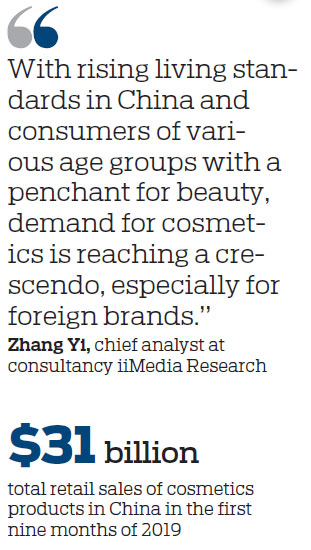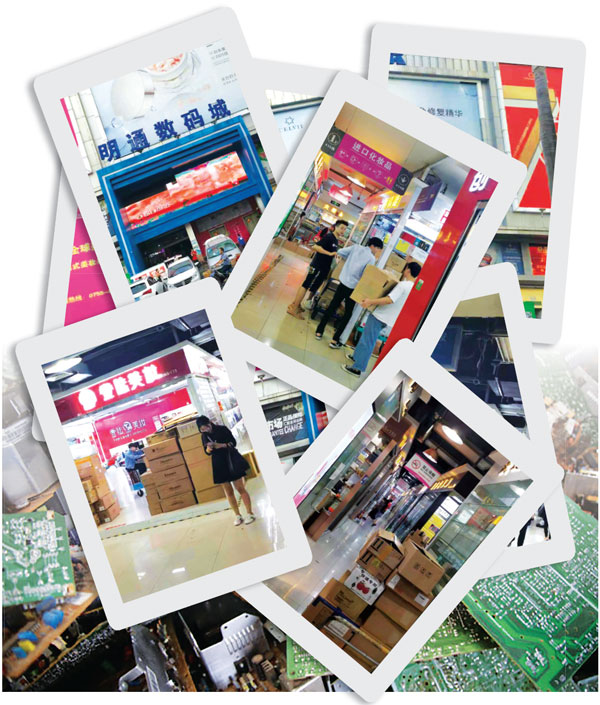Fifteen years have brought significant change at Huaqiang North road, where electronic vendors have turned into one of the biggest cosmetics importers in China as the nation has grown to become the world’s major consumer market. Chai Hua reports.
In a compact little shop on Shenzhen’s Huaqiang North Street – traditionally the city’s and the nation’s famed hardware paradise – the scene has taken a big twist. A vendor finds himself immersed in wrapping and packing up boxes that aren’t meant to contain electronic gadgets the area has been associated with for decades, but beauty products.
Huaqiang North, tucked away in one of the city’s most popular commercial enclaves and reemerged after a massive four-year facelift, has partially made way for what women are looking for – cosmetics and skincare products – instead of the latest Apple smartphones or bizarre gadgets.
Facial masks, creams, lotions and lipsticks have virtually squeezed out handsets, tablets and laptops at five markets along Huaqiang North Street and the proliferation is by no means over.
The change on one street in the mecca of hardware points to the opposite growth trends facing the two industries nationwide. Experts say Huaqiang North is on the right track in making another go at prosperity, but its infamous Shanzhai reputation has also shadowed its sustainable development.
Ming Tong Commercial City – a double-edifice marketplace housing more than 4,000 shops – is the first to launch off the area’s transformation.
Opened in 2005, the complex used to be China’s largest trading center for communication devices in terms of scale. But, with the exponential advent of e-commerce and sluggish sales of digital widgets, slumping profits had been the order of the day for tenants, many of whom were forced to pull down the shutters, some reluctantly.
The downturn spread to other shopping precincts along the street as well. According to a Shenzhen Evening News report, rentals at SEG Electronics Market – one of the district’s most popular markets – had come down four times in 2016.
It was too much to bear for the vendors, forcing Ming Tong Commercial City to make an abrupt turn in 2017 – importing and dealing in cosmetics following a thorough market investigation and survey.
From digital devices to cosmetics
The reverse initially applied only to just the first floor of the building and succeeded in luring many new tenants, so much so that almost the entire marketplace has now shifted to dealing in cosmetics.
Some vendors have set their sights on the most sought after products, including affordable and brand names, while some tend to concentrate on one segment, such as cotton pads, or products imported from a particular country, like Japan.
The beauty products have found their way to more than a dozen provinces across the Chinese mainland. Ming Tong says it aims to become the largest collection and distributing center for cosmetics in the country.
The market’s delivery system and cross-border trading experience, accumulated from its decades of trading in electronic gadgets, has fueled the success of the transformation.
Several other prominent markets in Shenzhen, such as Manhar Digital Plaza and Yuanwang Digital Mall, have also entered the fray, with glaring advertisements to recruit cosmetics tenants adorning their buildings in place of banners for electronics shopping malls.
Shop rents at Ming Tong have gone up to about 600 yuan per square meter, while those at other markets that have jumped on the bandwagon still stand at about 400 to 500 yuan per square meter.
Former electronics vendors have changed their store names and products, determined not to miss the boat. “I could sell hundreds of boxes (of cosmetics products) every day now,” said a vendor surnamed Zheng, who used to peddle electronics components at Ming Tong complex, but switched to cosmetics last year to turn the tide.
She has an ace up her sleeve – low prices that are only half of those charged by “official” stores on the mainland, online or offline. A facial mask from Japan, for instance, goes for about 140 yuan on Alibaba’s Tmall, but it costs around 80 yuan at Ming Tong – almost the same as in Hong Kong.
“Our products are imported directly from our exclusive suppliers overseas,” boasts Zheng. Her clients are mostly small retailers in third- and fourth-tier mainland cities or online sellers.
Some former electronics sellers have adopted a more conservative approach -killing two birds with one stone. A vendor, Xu Zhi, said he could no longer survive on just one sector, so he decided to take up the cosmetics business as well, besides selling his electronic devices.
Some fastidious customers may question if a computer dealer is professional enough to deal in cosmetics, but Xu countered it isn’t a problem. “I have my connections after eight years of trading in the market”, he said.
What he has to do is simple. He began offering quotations for his cosmetics items on his personal WeChat account in addition to his daily quotations of digital products, and opened an online cosmetics retail store.
The business model is the same. The quoted prices are relatively transparent although they do fluctuate, and buyers need to pay an extra percentage of the price, according to the volume of their purchases. After receiving an order, his supplier at Ming Tong will send the products directly to his clients.
But, there’s still a group of sellers who’re still sticking to the traditional business. Deng Lipeng, a computer shop owner at SEG Electronics Market, said that, as far as he knows, no shop there has switched to the cosmetics business yet.
But, he said people would trade in whatever they deem to be the most profitable. He had once tried his luck in cryptocurrency mining machines two years ago, but when it wasn’t up his alley anymore, he had to turn back.
Vendors on Huaqiang North Street are seen as being among the most sensitive and agile to market trends. The cosmetics trade is booming in China, while the handset business has turned sluggish.
According to data from market research firm Canalys, the Chinese mainland’s smartphone market had contracted by 3 percent in the third quarter of this year compared to a year ago.

In comparison, according to latest figures from the National Development and Reform Commission, total retail sales of all cosmetics products in China reached 215 billion yuan ($30.7 billion) in the first nine months of this year – up a whopping 12.8 percent from a year ago, the second-fastest speed of growth among all products in the country. At the same time, China imported $6.6 billion worth of cosmetics products – up almost 40 percent.
Huaqiang North Street also lured to its fold a cluster of comprehensive shopping malls in its spectacular shift, with their cosmetics departments posting an upsurge in business.
Authenticity vital to success
Yang Zhiliang, investment director of chain shopping-mall Maoye Commercial Company, said their store on Huaqiang North street deals in about 39 cosmetics brands, one of the largest in their southern China stores, and the number is expected to reach 50 next year.
The store has registered a 50-percent growth rate so far, said Yang, shrugging off competition fears from a rival distribution group across the street, explaining they are targeting different segments.
Zhang Yi, chief analyst at consultancy iiMedia Research, applauded the direction of the market’s transformation. “It could be a new path for Huaqiang North to take off again,” he said.
With rising living standards in China and consumers of various age groups with a penchant for beauty, demand for cosmetics is reaching a crescendo, especially for foreign brands, he said.
Besides, e-commerce plays a crucial role in cosmetics sales nationwide, and Ming Tong is a key supplier for small- and middle-sized e-retailers. A research survey showed that cosmetics items accounted for 45 percent of the entire consumption of goods purchased through cross-border e-commerce, while about three quarters of overall cosmetics retails are conducted online.
But, Zhang warned that the problem of fake products has also surfaced due to high-profit margins and tough anti-smuggling measures taken by the Customs authorities. He argued that a brick-and-mortar store can provide some degree of guarantee for product quality. This is also one of the reasons for the success of Huaqiang North Street’s transformation.
Nevertheless, he warned that the key is whether managers on Huaqiang North Street could maintain the authenticity of their products in the market.
One media report claimed that although Ming Tong Commercial City has assured that all its products are 100-percent authentic, supported formal examinations and pledged to pay compensation 10 times the value of any counterfeit product sold, many stores there have failed to produce official authorization certificates.
As a supplying source of many so-called daigous – cross-border personal shoppers who buy products overseas and resell them in China, vendors at Ming Tong go out of the way to provide special delivery services by sending the products directly to daigous’ clients from Huaqiang North, but would alter the consignor address to whatever they demand in order to dodge the infamous cradle of Shanzhai products.
There are also seemingly authentic stores bearing names like Top Land Cosmetics – a chain store brand from Hong Kong – and it would seem difficult for customers to distinguish the real from the fakes, just like what the electronics markets had been notorious for in the past.
Contact the writer at
grace@chinadailyhk.com


(HK Edition 11/15/2019 page9)
